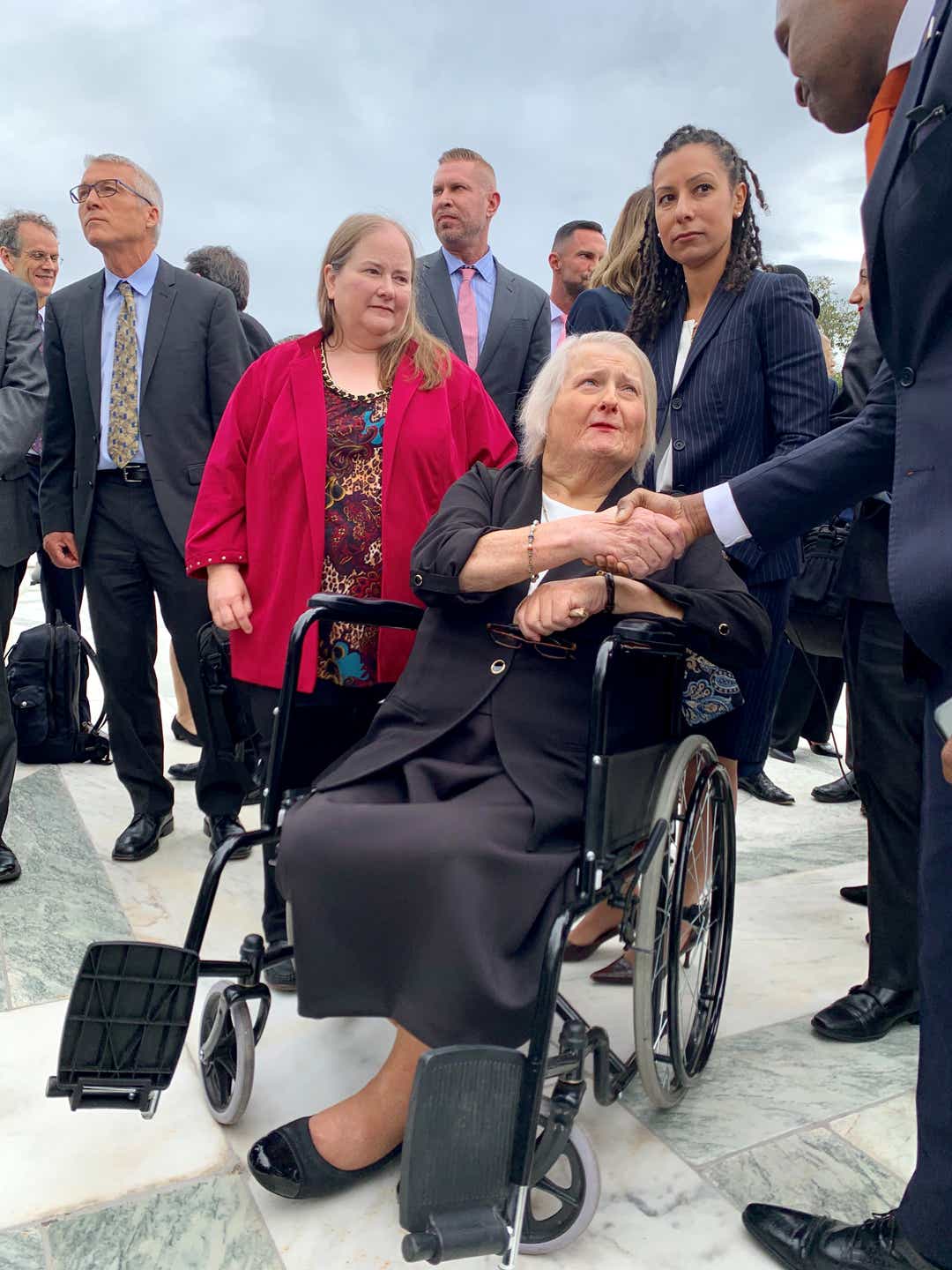The Michigan woman at the center of a high-profile transgender rights case pending before the U.S. Supreme Court has died, her family said.
Aimee Stephens, 59, who had kidney disease, had been in hospice care at home in recent days. She passed away Tuesday, her brother-in-law John Pedit said.
Stephens’ case was argued before the justices in October, and a ruling is expected by July. She was the first transgender person to have a civil rights complaint heard by the high court, according to the American Civil Liberties Union, which represented her.
"Aimee is an inspiration. She has given so many hope for the future of equality for LGBTQ people in our country, and she has rewritten history," Stephens' wife, Donna, said in a statement. "The outpouring of love and support is our strength and inspiration now.”

Stephens was in a wheelchair in October when she traveled to Washington to hear oral arguments in her case.
Her condition recently deteriorated to the point that she had to discontinue dialysis and was in stage four renal failure, according to the GoFundMe page that Pedit set up last week to help Stephens' wife, Donna, pay for end-of-life care and funeral expenses.
"Sadly it appears that Aimee will never see the result of her valiant and difficult fight for transgender rights," Pedit had written on the GoFundMe site.
The GoFundMe page had raised over $21,400 as of Tuesday afternoon.
Her death won't render the pending Supreme Court case moot, as her estate could still recover compensatory and perhaps other damages for the alleged violation of her rights, legal experts said.
At issue in the case is whether Title 7 of federal civil rights law, which prohibits workplace discrimination based on sex, applies to discrimination against transgender people.
Transgender activists say at stake in the case is their right to work, earn a living and support their families.
The funeral home and its supporters say a ruling for Stephens could prohibit sex-specific policies altogether, forcing entities to open facilities such as showers, restrooms, locker rooms and shelters to "men who believe themselves to be women."
Stephens was fired from her job as an embalmer and funeral home director at R.G. and G.R. Harris Funeral Homes in Garden City in 2013 after informing her boss she was transitioning from male to female and planned to wear women's clothing.
At that time, Stephens had been living as a transgender woman for years outside of work but had decided come out to her colleagues.
On behalf of Stephens, the federal Equal Employment Opportunity Commission in 2014 sued Harris Homes, which operates three funeral homes in southeast Michigan.
The owner of Harris Homes, Thomas Rost, contended that Stephens’ dress would become a distraction for grieving families. His lawyer argued the funeral home was within its rights to insist that Stephens adhere to its dress code for male employees during work hours.
The U.S. Circuit Court of Appeals for the 6th Circuit ruled against Rost in 2018, concluding in part that discrimination on the basis of transgender status is "necessarily" discrimination on the basis of sex. Rost and Harris Homes appealed to the Supreme Court.
Stephens grew up as Anthony Stephens in Fayetteville, North Carolina.
Stephens initially wanted to become a pastor and spent a year in seminary, but felt a calling to the funeral home industry and comforting families through their most difficult hours, she said in an interview last year.
She married and divorced, then married again after reconnecting with a childhood friend, Donna. She moved to Michigan 20 years ago to be with her, settling in Metro Detroit.
Donna supported Stephens through her transition, as did most of her extended family, she said last year.

But Stephens had difficulty finding work in the funeral home industry after her 2013 firing. She eventually got a position as an autopsy technician at the Detroit Medical Center's Sinai-Grace Hospital. She worked through the end of 2014, when her kidneys failed, and then retired.
Despite financial hardship in the years since, Stephens told The Detroit News last year she did not regret challenging Harris Homes' decision. But she never expected the case to go all the way to the U.S. Supreme Court, where she was optimistic about the outcome.
"I believe in what I'm doing. I've stood up for myself to make sure that it happens. That's what keeps me going," she said.
"If you're part of the human race, which we all are, we all deserve the same basic rights. We're not asking for anything special. We're just asking to be treated like other people are."
mburke@detroitnews.com
"case" - Google News
May 13, 2020 at 12:32AM
https://ift.tt/2WPzjBB
Michigan woman at center of transgender civil rights case dies at 59 - The Detroit News
"case" - Google News
https://ift.tt/37dicO5
Shoes Man Tutorial
Pos News Update
Meme Update
Korean Entertainment News
Japan News Update
Bagikan Berita Ini














0 Response to "Michigan woman at center of transgender civil rights case dies at 59 - The Detroit News"
Post a Comment